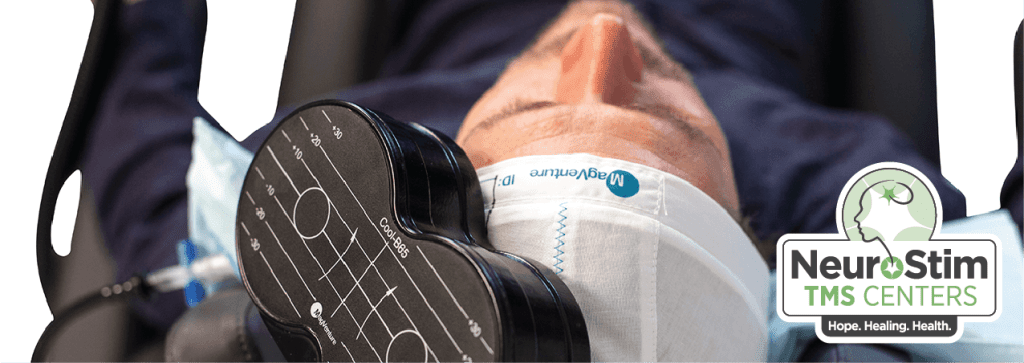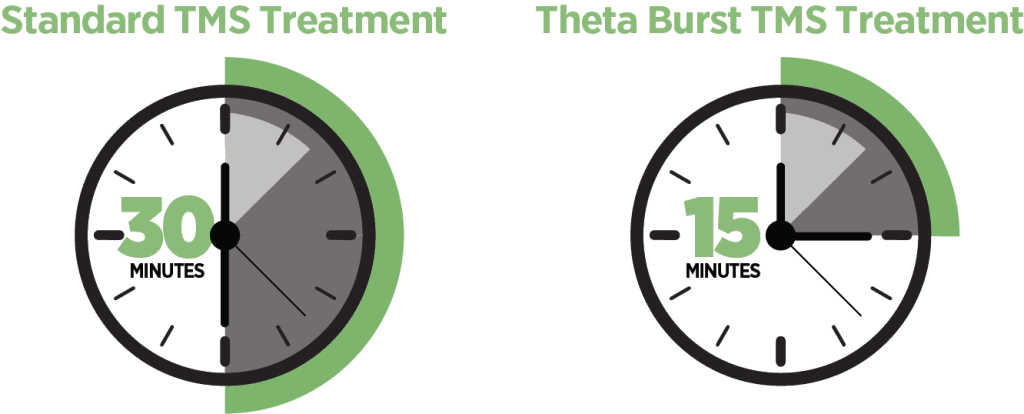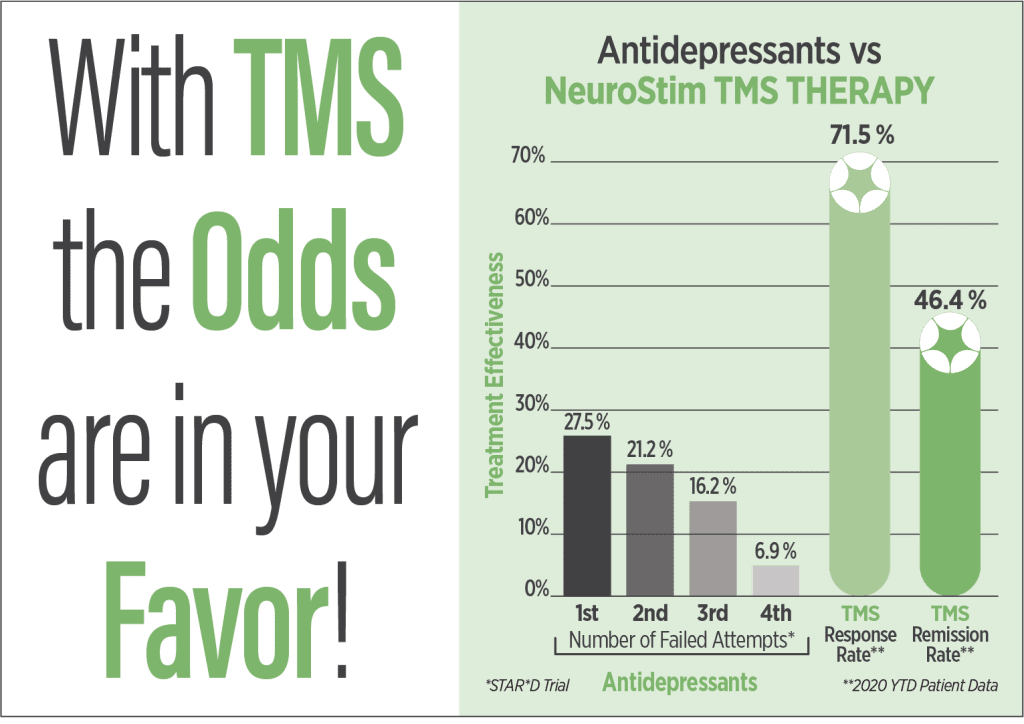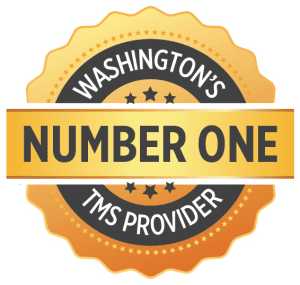
Not all treatments for depression are effective — some keep patients in an endless cycle that never allows for them to gain relief. With an approximate 70% efficacy rate, Transcranial Magnetic Stimulation, or TMS, is often the solution.
“Applying Transcranial Magnetic Stimulation to different parts of the brain repeatedly, we can modify the brain activity in those areas, and that can translate into a benefit for patients with different disorders.”1 Dr. Pascual-Leone, Professor of Neurology, Harvard Medical School.
The Endless Cycle of 1-2-3

The vicious cycle of attending therapy sessions coupled with frequent changes in medications leaves many people feeling defeated. Not only do they lose time and funds that could be spent carrying out other tasks, but they may also never get relief from their symptoms. It has been reported by various studies that major depressive disorder is often treatment-resistant, meaning that the likelihood of symptom reduction or remission through medication is reduced. Given that less than half of patients with major depressive disorder are ever successfully treated with medication and therapy alone, for many it becomes necessary to explore other avenues. Advances in medical technology have allowed TMS to rapidly become one of the most recommended ways to help patients gain relief from their depressive symptoms.

What Is TMS Therapy?
TMS Therapy is an outpatient procedure that uses electromagnetic pulses to target specific sections of the brain responsible for mood regulation. TMS was approved by The Food and Drug Administration in 2008 as a safe and effective treatment for depression at registered TMS clinics.
Through the use of a coil that is placed at precise locations on the patient’s scalp, the electromagnetic pulses delivered to the brain target the nerve centers that are responsible for mood control and assist in balancing the brain’s chemical concentrations by forcing the neurons to fire and subsequently release neurotransmitters.

How Long Do These Treatments Last?
TMS is a non-invasive, outpatient procedure that lasts between 15 and 30 minutes daily, depending on the protocol prescribed by the treating provider. A full treatment cycle is typically 30 sessions over a six-week period. Once completed, individuals typically maintain their results for at least 6-12 months, and for many individuals results can last much longer. This is due to the high level of efficacy associated with TMS treatments. Studies have shown that TMS offers a 70% chance of achieving a clinically significant improvement in symptoms with approximately 45-50% of patients reaching remission. It has also been reported that 2/3 of patients who undergo this procedure derive lasting success.

How Effective is TMS in Treating Depression?
While not commonly well known to the general public, TMS treatment is rapidly growing in popularity among the behavioral health community due to its high efficacy rates. But the question for many is, “just how effective is Transcranial Magnetic Stimulation in helping a patient with a depressive disorder?”
The main challenge with depression is the mood-altering and inhibiting nature of its symptoms. As such, the treatment of this mental condition, just like others, focuses on managing and eradicating symptoms. TMS achieves this by focusing electromagnetic pulses on the area of the brain responsible for mood, known as the dorsolateral prefrontal cortex (DLPFC).
This is done by placing a coil, that delivers an electromagnetic pulse, to the patient’s brain. This procedure is non-invasive and takes place entirely outside of the body, without any need for anesthesia or admission of patients. With TMS, patients get the chance to come in for their treatment sessions and carry out their daily activities without hindrance afterward. Some of the perks that come with undergoing TMS treatments include the absence of medication, no drug-related side effects, and more efficacy in battling depression.
Data by the Anxiety and Depression Association of America suggests that medication and talk therapy are only effective in treating less than half of depressive patients. This is worrisome, as depression affects a staggering 18.1% of adults living in America. There’s no telling how high this figure could rise with the unabated pandemic. A beacon of hope has, however, appeared with TMS treatments. The success rate of this procedure is as high as 70-75%, meaning patients are more likely to recover and live meaningful lives without interruption. TMS has also shown to be effective in treating PTSD and anxiety in approximately 50% of patients.
In some cases, patients may recover fully from their symptoms without reoccurrence. The probability of this makes TMS more alluring than other forms of treatment. More than half of the patients who undergo TMS procedures benefit from prolonged outcomes. The effects of one complete cycle often last as long as six months or a year, depending on the severity of symptoms and triggering factors. Not all patients require a full 30-36 treatments to reach remission; some patients experience significant improvement in their first few sessions and some reach full remission in as few as 10-15 treatments.

Currently, TMS is the most effective non-invasive treatment for major depressive disorders and medication-resistant symptoms of depression. A full procedure generally consists of 30 stimulating sessions spread across 5 to 6 weeks. NeuroStim TMS clinics provide affordable TMS treatments to depressive patients in and around Joint Base Lewis-McChord, and throughout the greater Puget Sound region.
Looking back on his experience administering TMS over the years, NeuroStim’s Chief Medical Advisor, Dr. Jonathan Downar, shares his insights on TMS and its growing popularity below:
“TMS is one of the fastest growing  treatment techniques in mental health and likely one of the fastest growing in medicine overall. The annual growth is likely around 30% and increasing each year. What’s encouraging to see is that the treatment techniques are continuing to improve year over year, with increasing efficacy and a bright future not only depression treatment but a number of other conditions currently undergoing advanced clinical studies as well.”
treatment techniques in mental health and likely one of the fastest growing in medicine overall. The annual growth is likely around 30% and increasing each year. What’s encouraging to see is that the treatment techniques are continuing to improve year over year, with increasing efficacy and a bright future not only depression treatment but a number of other conditions currently undergoing advanced clinical studies as well.”
NeuroStim TMS clinics offer individuals living with depression an opportunity to get effective treatment without medication. NeuroStim TMS offers F.D.A approved TMS treatment to patients living in the Puget Sound area, with treatment clinics in Everett, Bellevue, Seattle, Tacoma and Olympia.

1 NPR: Fresh Air: 4-21-16
